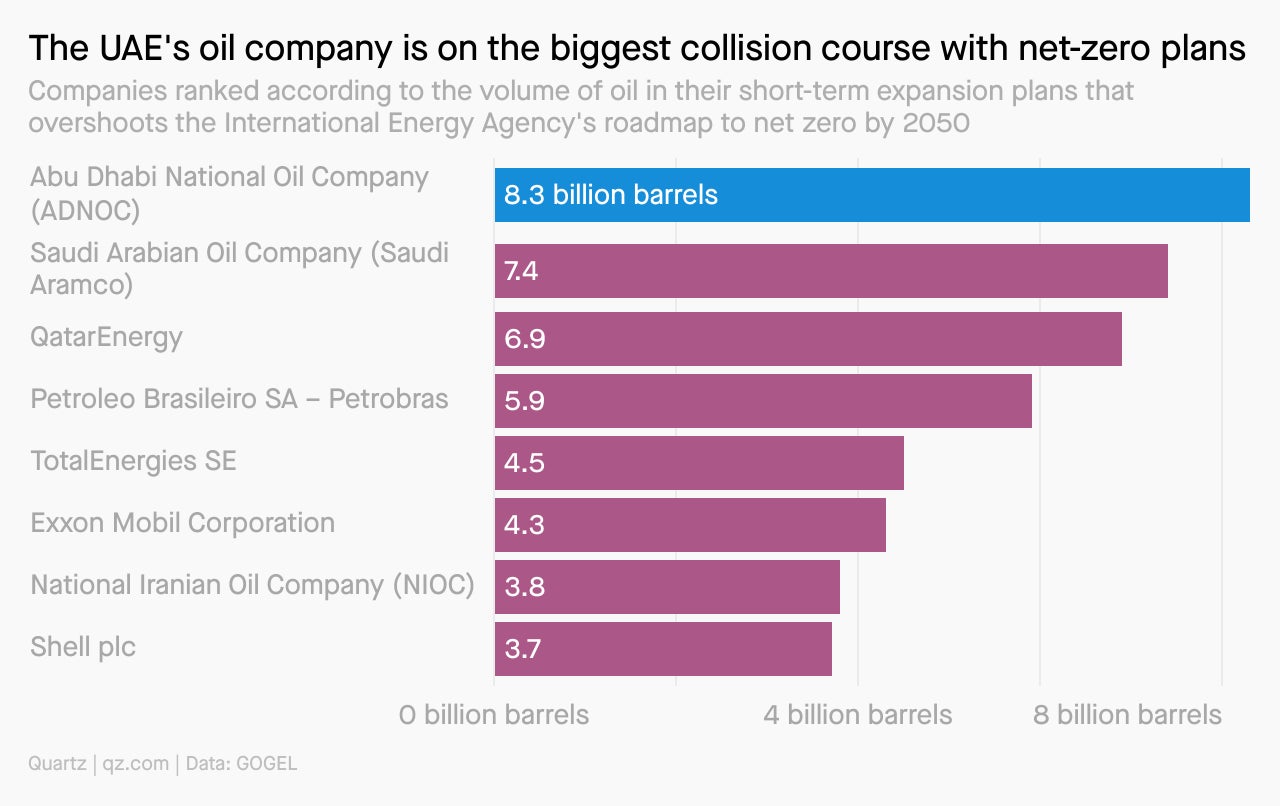The great climate-summit hijack
As COP28 begins in Abu Dhabi, it's worth asking: Do these summits even move the needle on climate change any more?


Hi, Quartz members!
Of the many dispiriting ways in which a climate summit can start, the United Arab Emirates may have found the worst of them all. Mere days before the UN’s COP28 summit was to begin on Nov. 30 in Abu Dhabi, the Centre for Climate Reporting and the BBC revealed that the UAE has used the summit as a pretext to boost its oil and gas business.
Sultan al-Jaber, the Emirati president-designate of COP28, is also the CEO of the Abu Dhabi National Oil Company (ADNOC), a title he has retained despite calls for him to step down for the duration of his COP presidency. During preparatory meetings with business leaders and government officials, al-Jaber’s COP28 staff raised talking points suggested by ADNOC, according to leaked documents. Al-Jaber has denied the BBC report.
A second revelation on Monday (Nov. 27) showed that Saudi Arabia, the UAE’s close ally, is aiming to hook poorer nations on its fossil fuel products as part of an “oil demand sustainability program.” This includes pushing supersonic air travel, which guzzles more fuel than conventional flights, and helping develop cheap combustion engines for cars. The program, though, is framed in the language of the climate movement: it purports to create an energy mix for the world that is “economically and environmentally efficient,” and to aim at “increasing sustainability.”
Bad news about the changing climate emerges practically every week. But these twin reports stress what many have feared for a while now—particularly since 2021, when Abu Dhabi, one of the world’s biggest and most unrepentant oil producers, was chosen as the host of COP28. The world’s leading climate summit, and the climate agenda in general, has slowly but surely been hijacked by oil and gas lobbies.
CHARTED
The Global Oil and Gas Exit List, a public database, tracks the activities of more than 1,600 fossil fuel companies worldwide. One of the estimates it makes is: What portion of a company’s planned short-term expansion exceeds the International Energy Agency’s (IEA’s) net-zero roadmap?

Among the 20 top companies ranked by this metric, the Abu Dhabi National Oil Company stands at the very top. A whopping 92.7% of its short-term upstream expansion will overshoot the IEA pathway.
SUMMIT TALES
It’s a tricky thing. In any discussion about pathways to a low-carbon world, fossil fuel companies must inevitably be involved. Their product has been both essential to economic development and responsible for poisoning the planet, and the green transition will require their willingness and ability to pivot toward cleaner forms of energy.
At the same time, the track record of these companies in dissimulating, covering up, and pursuing profit is difficult to ignore. That’s just what they do—and that’s what they’ve increasingly brought to the COP climate summits.
COP veterans date the serious corporatization of the summit to COP25, in Madrid in 2019, when a Spanish energy company called Endesa—a major emitter of greenhouse gases—paid for the right to festoon the conference venue with its logo. In 2021, the 500 oil and gas lobbyists at the COP summit in Glasgow outnumbered even the biggest national delegation. The following year, at Sharm el-Sheikh in Egypt, 636 lobbyists turned up, and 70 of those came from the UAE.
Their presence makes a difference. Here’s an example. At COP28, fossil fuel companies as well as oil-producing nations will push heavily for carbon capture as a solution to the climate crisis. This roseate vision is a license for humankind to continue using oil and gas endlessly, so long as the emissions are captured and sequestered. But aside from the fact that carbon capture has never been proven or implemented at scale, other national delegates worry that even discussing it at length will crowd out progress on renewable energy and climate justice. Which, of course, suits oil producers just fine.
The influence of the oil lobbyists also feeds into a larger concern that the COP summits have become carnivals and trade shows—events where self-congratulatory displays win out over serious climate work, as business gets transacted on the sidelines. At best, the well-intentioned plans get diluted or never go into play. The UN Green Climate Fund, intended to collect $100 billion a year from wealthy countries, so as to fund the energy transitions of developing nations, has gathered $12.7 billion in total since 2019.
A loss-and-damage fund, announced at the last COP summit, counted as a rare win, and on the first day of this year’s COP, nations agreed to pay into the fund, with the UAE pledging $100 million. (For reference, ADNOC’s net profit in 2022 was $4.9 billion.) But the real crux of COP28 will be the success or failure of a hard deal to phase out fossil fuels. For that to happen at a summit presided over by a petrostate, with oil and gas companies thronging the sidelines, would be the most astonishing step forward in the battle against climate change.
QUOTABLE
“I have just returned from Antarctica—the sleeping giant. A giant being awoken by climate chaos... The Antarctic is waking up and the world must wake up... This year, Antarctic sea ice hit an all-time low. That matters for us all. What happens in Antarctica doesn’t stay in Antarctica.”
— Antonio Guterres, the secretary-general of the United Nations, in remarks released after a visit to Antarctica. Guterres ended by saying: “Leaders must not let the hopes of people around the world for a sustainable planet melt away. They must make COP28 count.”
ONE 🛢️ THING
It isn’t just ADNOC that has big plans to expand its fossil fuel footprint. A UN report published on Nov. 8 (pdf) found that, despite their climate rhetoric, the world’s top producers are all planning to extract more, not less, oil and gas than at any point in their history. Global coal production is expected to increase until 2030, and global oil and gas production until 2050. Note:
🇺🇸 The US Energy Information Administration predicts that oil production will remain at record high levels of 19 million to 21 million barrels a day between 2024 and 2050. Natural gas production will rise steadily, hitting 1.2 trillion cubic meters in 2050.
🇸🇦 In a scenario where global demand for oil levels off around 2047, Saudi Arabia’s domestic oil production will rise by 1% every year until 2050, representing total growth of 47% between 2015 and 2050.
🇮🇳 India expects to produce 1.5 billion tons of coal in 2030, more than double its 2021 level.
🇨🇳 China’s coal production is expected to hit 3.7 billion to 3.9 billion tons between 2025 and 2030. China National Petroleum Corporation aims to increase natural gas production by 56% between 2030 and 2050.
Thanks for reading! Don’t hesitate to reach out to us with comments, questions, or topics you want to know more about.
Have an emissions-free weekend!
—Samanth Subramanian, Weekend Brief editor